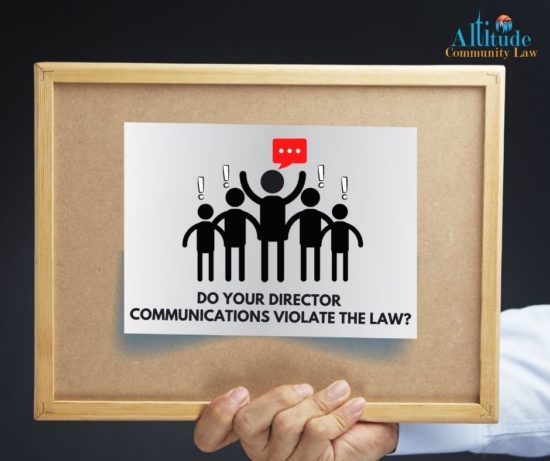
Let’s face it, being a board member is no easy task, especially if there is discord among directors on the board. When there is distrust among directors, communication becomes funnelled, selective, and exclusionary. But is this type of communication really in the best interests of the community? And even more so, is it legal? Oftentimes, it is not.
The Colorado Common Interest Ownership Act (“CCIOA”) was amended in 2009 to address communication between directors and essentially prohibits secret communications between directors, as well as hoarding information. Specifically, Section 303(1)(b) of CCIOA provides as follows:
- Notwithstanding any provision of the declaration or bylaws to the contrary, all members of the executive board shall have available to them all information related to the responsibilities and operation of the association obtained any other member of the executive board. This information shall include, but is not necessarily limited to, reports of detailed monthly expenditures, contracts to which the association is a party, and copies of communications, reports, and opinions to and from any member of the executive board or managing agent, attorney, or accountant . . . [emphasis added].
When violations of the above statutory provision occur, oftentimes, board members don’t even realize they are doing anything wrong. In other situations, directors are blatantly violating the law. Below are several examples of communications (or lack thereof) that violate Section 303(1)(b) of CCIOA.
- Board member A is disliked by the remaining directors who believe it would be in the best interests of the community if board member A is removed from the board. As a result, this group of directors reaches out to the association’s attorney, at the exclusion of board member A, to seek advice on how board member A may be removed. This conversation with the attorney is never communicated to board member A.
- Board member A and board member B do not get along. Most board meetings are continually disrupted by bickering between these directors. The three remaining directors do not know what to do, so they reach out to the community manager and the association’s attorney for advice. Although the advice is used, these communications are not disclosed to board members A or B.
- Board appoints director A to oversee the community painting project. During the project, painting contractor advises director A there may be structural problems with one of the buildings and recommends a structural engineer be retained. Director A contacts the community manager and instructs her to obtain bids. Neither the conversation with the contractor, nor the request for bids was communicated to the remaining directors.
- Board member A believes the board is not properly exercising its maintenance obligations, so she contacts the association’s attorney. Attorney advises that everything is being performed correctly. Board member A does not communicate this information to the rest of the directors believing no harm, no foul.
- Board member A and board member B believe that board member C is disclosing board information to owners in the community, and they don’t trust him. As a result, board members A and B discuss association business outside of meetings between themselves and leave board member C out to ensure confidential information does not get leaked.
In some of the above examples, directors believed they were acting in the best interests of their communities by excluding certain directors from communications; but in reality, these directors were exposing themselves and their associations to liability by violating the requirements of the law.
This is not to say that board members can never communicate unless everyone is on the email or on the call, but it is saying that whatever information is obtained by a board member, or group of board members, concerning the association, must be shared with all other directors on the board.
For more information concerning communications between board members, please contact an Altitude attorney at 303.432.9999 or at [email protected]